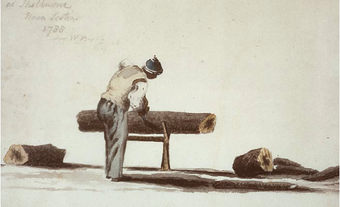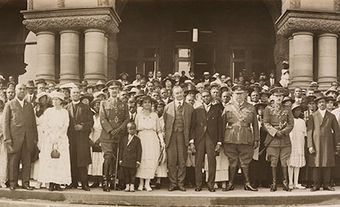F. Wayne Adams, CM, ONS, politician, activist, journalist, entrepreneur (born 1943 in Halifax, NS). Wayne Adams has been an entrepreneur, a broadcast journalist, a municipal and provincial politician, and an environmental activist. He was the first Black Canadian elected to the Nova Scotia legislature and to serve in its cabinet. He was made a Member of the Order of Canada and has received the Order of Nova Scotia.
Early Years
Adams was born in Halifax, Nova Scotia. His grandfather, Augustus Adams, was a goaltender in the early years of the Colored Hockey League of the Maritimes. Wayne’s father, who also played hockey, died when Wayne was 13 years old. His teen years were shaped by a number of positive role models including his mother and uncles; as well as church and community leader Reverend W. P. Oliver. All inspired Adams to be industrious, considerate of others, and to work hard to achieve his goals.
Early Career
Adams’s first full-time job was at a Halifax car dealership. He became the service sales manager and Halifax’s first Black Canadian new car salesman. He then became the manager of the province’s first indoor service station. With the opening of his Shell station in Lower Sackville, Adams became Nova Scotia’s first Black Canadian service station owner-operator.
Always interested in the news and current affairs, Adams then became a broadcast journalist. In 1969, he reported on the first Canada Summer Games, held on the campus of Saint Mary’s University. From 1972 to 1978, he produced and hosted The Black Journal, a weekly radio program. It reported on news and ideas from a Black Canadian perspective. In 1973, Adams stopped working at the service station and began working as an information officer with the provincial government.
Municipal Politics
Adams had shown an interest in politics when he was elected to the Student’s Council at Halifax Vocational High School in grades 11 and 12. In 1979, his concern with environmental and economic issues, along with the manner in which the needs of Halifax’s Black Canadians were being ignored, led to his running for municipal office. He understood the challenges facing a Black Canadian in local politics; the city had elected its first Black Nova Scotian, Graham Downey, only five years earlier. Adams won a seat on the municipal council of what was then Halifax County. He was re-elected five times and served for 15 years. He also served as Halifax’s deputy mayor from 1982 to 1983.
Provincial Politics
From 1990 to 1993, Adams was the executive director of the Black Cultural Centre for Nova Scotia. In late 1992, he announced his intention to run for a seat in the Nova Scotia legislature as a member of the Liberal Party. He was supported by many people; but he also confronted blatantly racist insults and incidents. He later said, “That kind of negative reaction just exhilarated my efforts to go on and run and win.”
On 25 May 1993, Wayne Adams was elected to represent the overwhelmingly Black riding of Preston. He became the first Black Canadian elected to the Nova Scotia legislature. (See also Members of Provincial and Territorial Legislatures.) He received letters of congratulations from across Canada. Premier John Savage understood the significance of his election; he quipped that Adams lived only a ten-minute walk from the legislature building but had taken 300 years to get there.
Adams became the first Black Canadian in Nova Scotia’s cabinet. He was appointed the Minister responsible for the Communications and Information Act and Minister of Supply and Services (1993–95). He also served as Minister responsible for the Emergency Measures Act and Minister of the Environment (1995–98), and as Minister responsible for the Nova Scotia Boxing Authority (1997–98).
Among his accomplishments was the development of Canada’s first solid waste management strategy. (See Waste Disposal.) Implemented in 1995, within five years it had diverted 50 percent of waste from landfills. The strategy also created the Resource Recovery Fund Board; waste management regions; enviro-depots; and a centralized composting system. Related legislation reduced the number of landfills by 75 percent and introduced stricter guidelines for those remaining. As a result, the pollution of adjacent rivers and streams was significantly reduced.
Adams introduced important amendments that helped preserve nearly 8,000 acres of environmentally significant land by bringing it all under public control. He also led the reengagement of old trade agreements between Nova Scotia and Caribbean island nations. This led to delegations from Canadian environmental industries making deals in Trinidad and Tobago and Barbados. However, while Adams was accomplishing a great deal, the government became increasingly unpopular. As a result, many Liberals lost their seats in the 1998 provincial election, including Adams.
Life After Politics
Following his defeat, Adams remained active and influential in business, cultural and religious organizations. These included the Halifax Board of Trade; the Lions Club; the Atlantic Baptist Convention; and the Nova Scotia African Baptist Association. He served as the director of various groups, including the Halifax Foundation; the Nova Scotia Gaming Corporation; the Citadel Theatre Society; and the Halifax Citadel Amateur Boxing club. He was also the chairman of the Nova Scotia Home for Coloured Children. In 2011, he was invited to the first United Nations’ International Decade for People of African Descent.
Adams’s became the founding president of Chebucto Windfields, a company focused on creating electricity through wind energy. He also became president of the Nova Scotia Environmental Industries Association. The non-profit organization promotes environmental services and products while linking federal and provincial governments, universities and businesses. (See also Wildlife Conservation and Management.)
In 2003, Adams founded and became CEO of the Adams Consulting and Management Group. It advances initiatives that address community economic development, renewable energy systems and product development. It also promotes business opportunities for entrepreneurs in Atlantic Canada. Adams is also the Special Project Coordinator with Perennia Food and Agriculture Inc., which supports environmental interests and Black entrepreneurs.
See also Black Cultural Centre for Nova Scotia; Africville; Black Voting Rights in Canada; Order of Nova Scotia.
Awards
- Outstanding Young Canadian Award (1976)
- Person of the Year, Halifax Chamber of Commerce (2004)
- Member, Order of Canada (2004)
- Honorary Doctor of Civil Law, Saint Mary’s University (2004)
- Order of Nova Scotia (2011)
- Honourable Member, Executive Council of Nova Scotia (2012)
- Queen Elizabeth II Diamond Jubilee Medal (2012)

 Share on Facebook
Share on Facebook Share on X
Share on X Share by Email
Share by Email Share on Google Classroom
Share on Google Classroom



